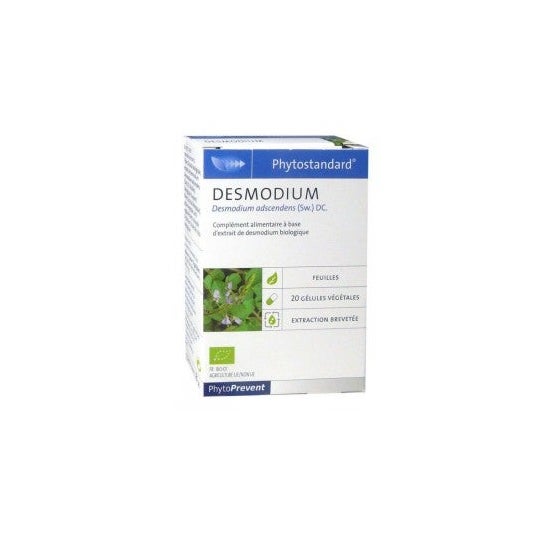Description
Dietary supplement based on organic Desmodium extract. Desmodium will give your liver a boost; it is essential during a detox cleanse.
CHARACTERISTICS
The Phytostandard of Desmodium is made from fresh (frozen after harvest) plants with traceable origins. The manufacturing, from the patented extraction to the encapsulation, is carried out in France, allowing for traceability of the products from production to distribution. Certified Organic Agriculture, the Phytostandard of Desmodium guarantees that at least 95% of its ingredients are organic. A patented extraction process
Each plant can contain up to 250 compounds within its cells. All these compounds form the totum of the plant. Not all plant extracts are equal: the extraction process is a key factor in preserving the integrity of the plant's compounds. PhytoPrevent dietary supplements benefit from an extraction method that allows for maximum recovery of the plant's compounds. The leaves of Desmodium are frozen after harvest to preserve the compounds. This is followed by grinding and extraction according to the patented Phytostandard process, known for its respect for the integrity of the plant's compounds. The resulting Desmodium extract is alcohol-free. It is then freeze-dried, meaning dehydrated at low temperatures to be placed in a vegetable capsule.
Properties of Phytostandard Walnut Phytoprevent
Tonic and astringent properties
Walnut leaves, thanks to their tannins, are used orally or locally for manifestations of venous insufficiency such as haemorrhoids. This vitamin P property allows for increased capillary resistance and venous tone, decreased capillary permeability, and stabilization of collagen.
Antioxidant property
In vitro, a walnut leaf extract shows antioxidant activity (ability to trap diphenylpicrylhydrazyl or DPPH radicals) superior to butylhydroxytoluene (BHT) and α-tocopherol.
Anti-infectious properties
*Antibacterial. In vitro, walnut leaves inhibit the growth of certain Gram-positive bacteria such as Bacillus cereus and Staphylococcus aureus, which can cause food poisoning.
*Antifungal. In vitro, walnut leaves inhibit the growth of two fungi responsible for skin and nail mycoses, Microsporum canis and Trichophyton violaceum.
Antidiarrhoeal property
This property arises from the tannins in walnut leaves, particularly from:
- their affinity for protein molecules, specifically digestive enzymes,
- their astringent property, which tightens the digestive mucosa,
- their antiseptic effect.
Walnut leaves are thus traditionally used in the symptomatic treatment of diarrhoea, particularly infectious diarrhoea.

